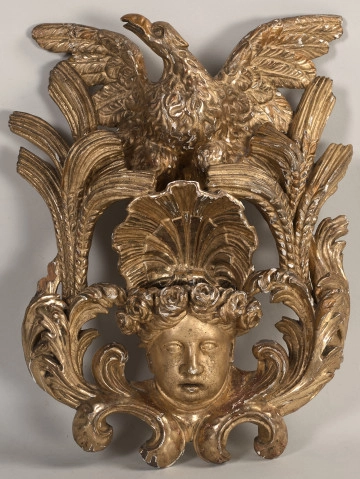
Stick
18th century
Castle Museum in Łańcut
Part of the collection: Weapons, music instruments, varia
The litter is made in Louis XV style, decorated with motives characteristic for Rococo style from 1730–1750. It was made around the mid-18th century in France. It has a cuboid shape with three straight walls, while the back wall is rounded for greater comfort for the person being carried. In the side walls and in the door (occupying the entire width and height of the litter) there are windows that can be lowered by means of belts (air conditioning is thus ensured). Two long rods (resting on the sides of the litter) are used for carrying, which are inserted into the hasps located at the bottom of the litter’s sides. In front, a medallion with the letters “MB” is placed on the door of the litter surrounded by flower garlands. According to tradition, this litter belonged to the French bishop of the diocese of Leon – Louis Honorius de Sabran. In the period before the French Revolution, he carried out work in his diocese, while at the court of the king he held the first position of confessor to the king (1767–1774) and later (from 1774) he was the first confessor to Marie Antoinette. In 1780, he was given the title of Grand Chaplain to Queen Marie Antoinette of France and administered the royal chapel at Versailles. After the outbreak of the revolution, of which he had a negative opinion, he went into exile. He spent time in England, the Netherlands, Prussia and Austria, where in Vienna in 1803, he met Princess Izabela Lubomirska, née Czartoryska, known as the Princess Marshal, who invited the French émigré to Łańcut Castle, where he received his own his own apartment. While in Łańcut, the bishop took an active part in the religious life of its inhabitants, and in the absence of the Princess Marshal, he managed her estate until his death in 1811. Today the litter is exhibited in the Great Entrance Hall and welcomes tourists visiting the interiors of Łańcut Castle.
Author / creator
Dimensions
height: 117 cm, width: 82 cm
Object type
Weapons, instruments, varia
Technique
carpentry
Material
glass, metal, leather, wood, damask
Creation time / dating
Creation / finding place
Owner
Castle Museum in Łańcut
Identification number
Location / status

unknown
18th century
Castle Museum in Łańcut

unknown
18th century
Castle Museum in Łańcut

unknown
19th (?) century
Castle Museum in Łańcut
DISCOVER this TOPIC
National Museum in Lublin
DISCOVER this PATH
Educational path
0/500

We use cookies to make it easier for you to use our website and for statistical purposes. You can manage cookies by changing the settings of your web browser. More information in the Privacy Policy.
We use cookies to make it easier for you to use our website and for statistical purposes. You can manage cookies by changing the settings of your web browser. More information in the Privacy Policy.
Manage cookies:
This type of cookies is necessary for the website to function. You can change your browser settings to block them, but then the website will not work properly.
WYMAGANE
They are used to measure user engagement and generate statistics about the website to better understand how it is used. If you block this type of cookies, we will not be able to collect information about the use of the website and we will not be able to monitor its performance.